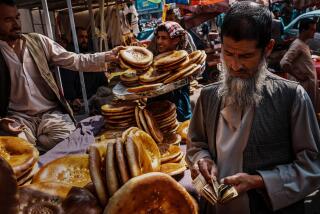Afghanistanâs Tough New Boss Hardens the Anti-Rebel Line
KABUL, AFGHANISTAN â Najib, the new one-named leader of Afghanistan, has a reputation for being tough, efficient and expert at infighting with rivals in his party. He is 38, a big man, built like a football linebacker, with black hair, a carefully trimmed black mustache and dark, flashing eyes.
He has taken a hard line against the anti-communist rebels, demanding additional sacrifices from his people in pursuit of a military victory that he admits may take years to achieve. By building up the Afghan army, depleted by desertions, he may help make it possible for Moscow to withdraw some of the estimated 120,000 troops it has here.
In a recent interview, Najib expressed confidence that the rebels--he calls them âbanditsâ--are losing the ability to mount a major attack. And he dismissed President Reaganâs renewed vow of support for the rebels as a âpolitical farceâ to conceal their military weakness.
Before taking over as the national leader, Najib was head of the Khad, the Afghan secret police. In that post he was able to plant spies among the insurgents and to persuade or bribe Pushtun tribes to block rebels from penetrating into Afghanistan from Pakistan. He worked closely with the KGB, the Soviet security service, to build the Khad into a widely feared force.
Originally, his name was Najibullah, which translates roughly as Godâs Nobleman. Since taking over as general secretary of the party, he has shortened it to Najib. During the party plenum at which he was picked to replace Babrak Karmal, the 57-year-old revolutionary who fell into disfavor with the Kremlin, Soviet tanks and troops surrounded key government and party headquarters here.
Kabul radio said the change was made because of Karmalâs bad health, but the hand-over had more of the flavor of a coup dâetat. This impression was strengthened, according to Western diplomats here, by demonstrating high school students, who chanted slogans for Karmal and against Najib. Police dispersed them.
The official announcement said Karmal resigned for health reasons, and emphasized that he will retain his ceremonial post as president of the Revolutionary Council and membership in the Politburo; it did not mention illness.
Unlike the Kabul-born, Persian-speaking Karmal, Najib is a Pashtun, a member of the biggest tribal group in the country. He grew up on the frontier with Pakistan, not far from the legendary Khyber Pass.
Najib attended the English-language Habibia College in Kabul and entered the medical college of the University of Kabul. At the university, according to Western sources, he spent most of his time in revolutionary agitation, and it took him 11 years instead of the usual six years to complete his studies. As a university student, he joined the Peopleâs Democratic Party, and when it split into two factions he became a member of the Parchami faction led by Karmal.
Najib had no direct part in the 1978 revolution that brought the Peopleâs Democratic Party to power. It was led by Nur Mohammad Taraki and Hafizullah Amin, but Taraki was assassinated in 1979 and Amin was killed when Soviet troops landed in the capital not long afterward.
Karmal was flown in from Moscow and installed as leader, triggering widespread resistance from Muslim fundamentalists who opposed the change. Najib reportedly arrived in Kabul on a Soviet plane five days after Karmal and was made director of the Khad.
Before long, open hostility developed between Najib and Gen. Sayed Mohammad Gulabzoi, head of the Interior Ministry. Agents of the Khad and the ministry harassed and tortured and killed each other, according to Western diplomats.
Najib, who began to play a more powerful role in the war effort, was shifted from the Khad to a secretary of the party last December. A few months later, he was given responsibility over the armed forces, and Karmal became virtually powerless.
It was a considerable turnabout, since Karmal, a founder of the party, has a long record of political struggle against the old Afghan monarchy. In contrast, Najib was practically unknown to most Afghans.
At a recent meeting organized by the National Fatherland Front, a coalition of groups backing the regime, Karmal sat silently while Najib gave a 20-minute lecture on the frontâs shortcomings. And at the conclusion of the meeting, Karmal was applauded when he embraced the frontâs president, a warm gesture immediately if awkwardly imitated by Najib.
In an interview in his offices at the Central Committee of the party, Najib sat under a portrait of Karmal. Asked why his picture had not been put up, he replied, âAs long as I am here, thereâs no need for my photograph.â
Elsewhere, however, there may be more concern about photo protocol. An official in an auto repair factory was asked why Karmalâs portrait was displayed instead of Najibâs next to one of Soviet leader Mikhail S. Gorbachev, and he replied: âIt will be there. Soon.â
More to Read
Sign up for Essential California
The most important California stories and recommendations in your inbox every morning.
You may occasionally receive promotional content from the Los Angeles Times.










